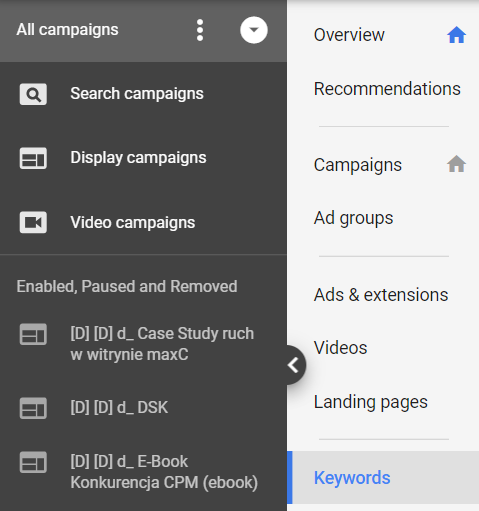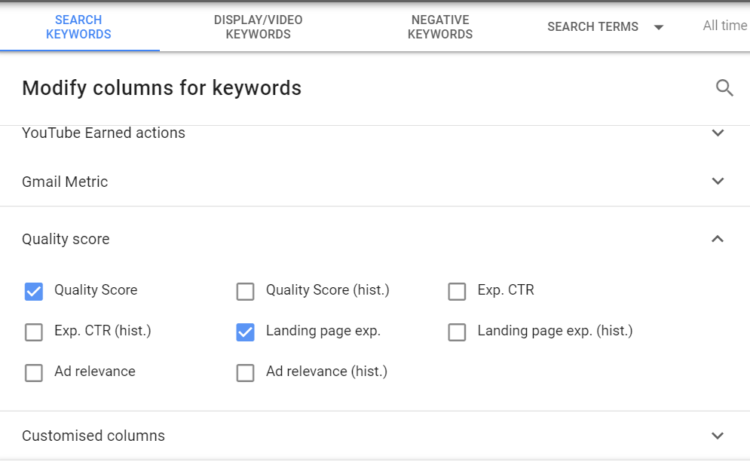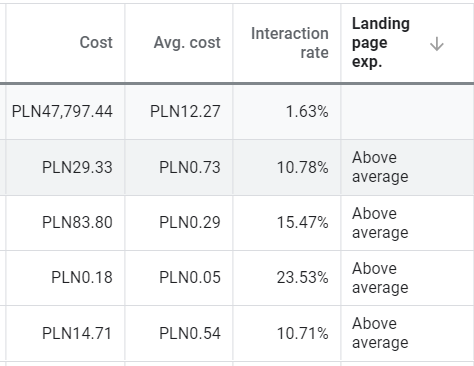How Can Landing Page Affect Your Google Ads Campaign?

What’s the influence of a landing page on Google Ads campaigns? Can it be optimised better, and increase the effectiveness of your ads? Here are the answers.
Let’s start with some theory…
Landing page – a specific URL address that the users visit once they click on your ad. In a broader sense, a landing page also refers to a website which you drive traffic to.
Quality Score – an estimate of the quality of your ads, keywords, and landing pages reported on a 1-10 scale. The higher the Quality Score, the better – simply because high-quality ads mean lower prices and better ad placements. In fact, this should be your goal all along: to pay less but still have your ads well-displayed and visible to the users.
| Components that make up the Quality Score | How to understand the components of the Quality Score? |
| Expected clickthrough rate (CTR) | The likelihood of your ad getting clicked when shown for a certain keyword. |
| Ad relevance | A metric that determines to what extent your ad can meet the expectations of someone who’s looking for a specific product or service. |
| Landing page experience | The relevance and user-friendliness of your website to its visitors, along with the ease of site navigation (we will cover this topic in detail a bit later). |
To put it simply – when deciding on the rank of your ad during the ad auction, Google’s algorithm takes into account the following equation:
Ad Rank = Quality Score * Maximum CPC (the highest amount that you’re willing to pay for a click on your ad)
It basically means that if your ad has a high Quality Score and a maximum CPC that is lower from the competitors’, it can be displayed higher than other ads (provided that their Quality Score is lower than yours).
You can read more about the Quality Score here: https://support.google.com/google-ads/answer/6167118?hl=en
What does a low Quality Score of your landing page affect?
As you already know, the Quality Score is one of the Google Ads’ metrics that determines to what extent your website meets the expectations of those who clicked on your ad. Basically, Google wants everyone to find what they’re looking for in the best way possible, that’s why the landing page experience affects the ad rank and thus, the CPC, campaign costs and the ad placement. This, in turn, means that your ads can be displayed less frequently or not be displayed at all if they drive traffic to a low-quality website which doesn’t really meet the needs of the search engine users.
How to improve the landing page experience?
Now it’s time to find out the ways that can help you optimise your landing page for Google Ads (and beyond):
1. Ensure easy site navigation
Carefully plan and organize the structure of your website, along with its subpages and categories – so that your customers can easily find, filter and browse the products or services that they are interested in. It applies both to online stores and service providers. The most important elements and offers should be well-displayed on the website. Make sure that the whole process that leads to conversion (i.e. making a purchase, contacting your company or downloading an app) is as simple, fast and user-friendly as possible. Keep the number of pop-ups to a minimum, or don’t display them at all – Google doesn’t like them very much.
2. Reduce the page load time and make sure it works fast
After clicking on the ad (no matter if on a desktop or mobile device), the landing page should load fast. The short page load time actually affects the bounce rate and conversion rate – not only when it comes to Google Ads, but in general. If you want to check the load time of your website, we recommend using this tool: https://developers.google.com/speed/pagespeed/insights/?hl=en.
3. Optimise your website for mobile devices
More than 50% of all Internet traffic comes from mobile devices, and this number is increasing steadily. Basically, Google scans your website to check whether it’s optimised for mobile devices – if it isn’t, the Google Ads campaign will most likely bring no satisfying results.
4. Ensure that your website is user-friendly and trust-worthy
Do you wonder how Google determines the trust and transparency of your website? It verifies, with specific algorithms, whether you have terms&conditions, privacy policy, and company details (along with the scope of its activities) featured on your website. A similar rule applies to contact details and payment information – they should all be visible to visitors.
5. Have relevant, useful and original content on your website
It’s essential that your ad actually refers to the content of the landing page it drives traffic to. You should not only optimize the content of the add itself – include relevant keywords in the title of the website, as well as the headings and the rest of the content. Once the user is looking for a specific product or service – the address that he or she lands on should match the search query. For example, if someone is looking for mountain bikes, they should not be redirected to a website with all possible bike types and accessories. Instead, you should place the most important and useful details of a specific offer on your landing page. Try to include relevant content that is not featured anywhere else (by your competitors, as an example).
6. Take care of the technical aspects of your website
The site should be hosted by trust-worthy and professional companies, and its code should adhere to the common (and recent) standards. From our experience, the server response time has a large impact on the Quality Score. If the site is unavailable, the score can easily decrease. It’s because in that particular moment the ads are driving traffic to a site that doesn’t work, even if it’s temporary.
7. Think like your customer
Clearly, from Google Ads campaigns’ point of view, it doesn’t only matter how Google evaluates your website, but also what does the user who clicked on the ad thinks of it. Remember that even the most attractive and well-optimised ad won’t bring the expected results in terms of conversion if the website is not user-friendly and easy to navigate. Every customer is different, which is why there is no single recipe for a perfect website. Still, it’s important to follow the common set of guidelines that will help you make the most of your ad budget. Read more about conversion-focused page optimization here: https://delante.co/how-to-increase-sales-and-conversion/.
What will happen after making these improvements, and when can I expect their outcomes?
Google regularly visits your website and “judges” it, based on many criteria. Therefore, making the above-mentioned changes can not only improve the quality of the landing page but also impact the ad relevance and its rank. You have to remember that the outcomes of those changes won’t be visible immediately, though. Stay patient and wait for Google to scan your website. The first results should be visible in a few days or weeks.
How to check the landing page experience?
In order to check the Landing page experience, you should:
1. Log into the panel and find the Keywords tab
2. Choose Columns from the bar above the keywords
3. Use the drop-down list under Quality Score and choose Landing page experience
4. Select Apply
In a table, you can find details on the Quality Scores for specific keywords: above average, average, or below average. If the score is above average, it means that there’s no need to optimize the website. This scale, however, might be much more complicated “inside” Google’s algorithms, which is why it may be beneficial to address any elements that could be improved anyway – even if the score seems high at first.
Conclusion
Everyone who runs Google Ads campaigns should be aware of how important the Quality Score is. One of the methods to improve it is to take care of your website. Landing pages should not only match the ads, but also be useful, well-designed and intuitive, having exactly what the user is searching for. Keep that in mind before you invest any time and effort in Google Ads, Facebook Ads that drive traffic to your website, or site positioning. It’s crucial, especially when the website is being designed – even if we don’t think of SEO and marketing at an early stage like this. We hope that the tips we’ve shared here, based on Google’s guidelines and our experience, will help you maximise the results of your Google Ads campaigns.






